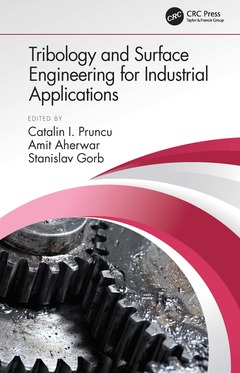Tribology and Surface Engineering for Industrial Applications

Tribology is a multidisciplinary science that encompasses mechanical engineering, materials science, surface engineering, lubricants, and additives chemistry with tremendous applications. Tribology and Surface Engineering for Industrial Applications discusses the latest in tribology and surface engineering for industrial applications.
This book:
- Offers information on coatings and surface diagnostics
- Explains a variety of techniques for improved performance
- Describes applications in automotive, wheel and rail materials, manufacturing, and wind turbines
Written for researchers and advanced students, this book encompasses a wide-ranging view of the latest in industrial applications of tribology and surface engineering for a variety of cross-disciplinary applications.
1. Mechanical and Sliding Wear Performance of AA2024-Aln/Si3N4 Hybrid Alloy Composites Using Preference Selection Index Method.
2. Wear Properties of UHMWPE: A Case Study of Gas Spring.
3. Tribology of Spray Formed Aluminium Alloys and Their Composites.
4. Ranking Analysis and Parametric Optimization of ZA27-Sic-Gr Alloy Composites Based on Mechanical and Sliding Wear Performance.
5. Surface Texture Properties and Tribological Behavior of Additive Manufactured Parts.
6. Wear and Corrosion of Wind Turbines.
7. Surface Texturing Practices to Improve the Wear Behaviour of Cutting Tools for Machining of Super Alloys.
8. Surface Engineering: Coatings and Surface Diagnostics.
9. Surface Coatings for Automotive Applications.
10. Tribology Aspects in Manufacturing Processes.
11. Electroless Coating Technique, Properties, and Applications.
Dr. Catalin Pruncu is a Charter and Member of the Institute of Mechanical Engineers (UK) since November 2015. Currently, his research is dedicated to further develop and validate hot form quench (HFQ®) Technology for use in the global automotive industry within Imperial College London as Research Fellow. He has published around 35 technical papers in reputed national and international journals/conferences and also served as reviewer for various journals. Catalin is editor and co-editor for two books and was recently granted a patent for a novel ball valve design with focus to reduce the friction between its main elements (i.e. ball/seat).
Dr. Amit Aherwar is Assistant Professor at the Department of Mechanical Engineering, Madhav Institute of Technology & Science, Gwalior, Madhya Pradesh, India. He received his Ph.D. from Malaviya National Institute of Technology, Jaipur, Rajasthan, India. He has more than eight years of teaching and research experience. His research interest includes Tribology, Biomaterials, Advanced composites materials, recycle/reuse of industrial wastes for engineering applications, and Multi Criteria Optimization. He has published more than 35 technical papers in reputed national and international journals/conferences, and also served as reviewer for various journals.
Prof. Dr. Stanislav Gorb is Professor and Director at the Zoological Institute of the Kiel University, Germany. He received his PhD degree in zoology and entomology at the Schmalhausen Institute of Zoology of the Ukrainian Academy of Sciences in Kiev (Ukraine). Gorb was a postdoctoral researcher at the University of Vienna (Austria), a research assistant at University of Jena, a group leader at the Max Planck Institutes for Developmental Biology in Tübingen and for Metals Research in Stuttgart (Germany). Gorb’s research focuses on morphology, structure, biomechanics, physiology, and evolution of surface-relate
Date de parution : 11-2021
15.6x23.4 cm



